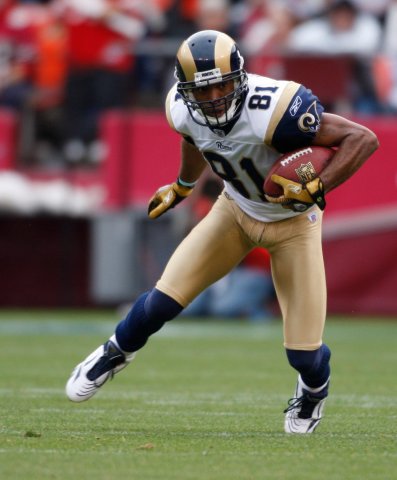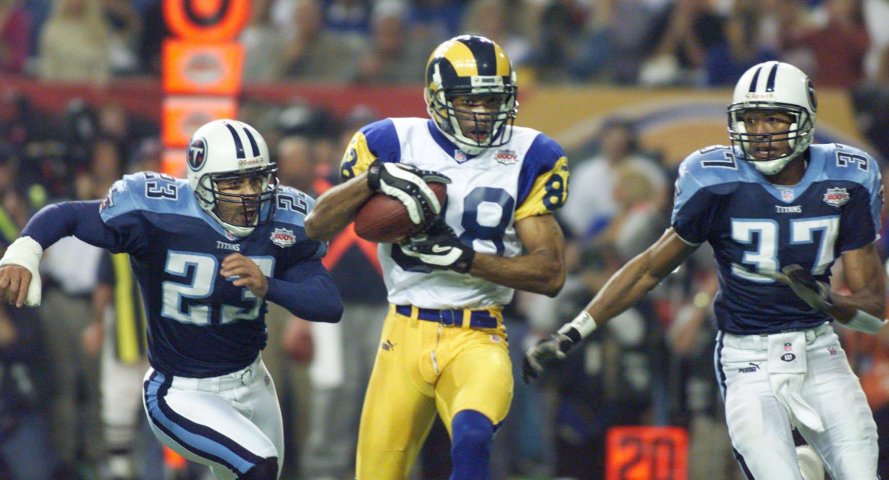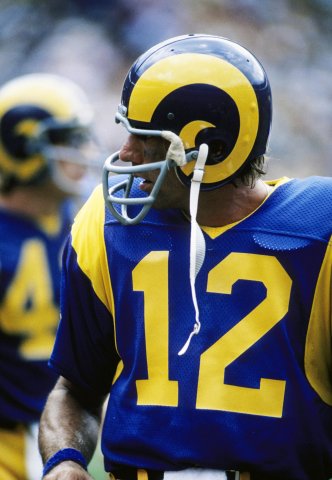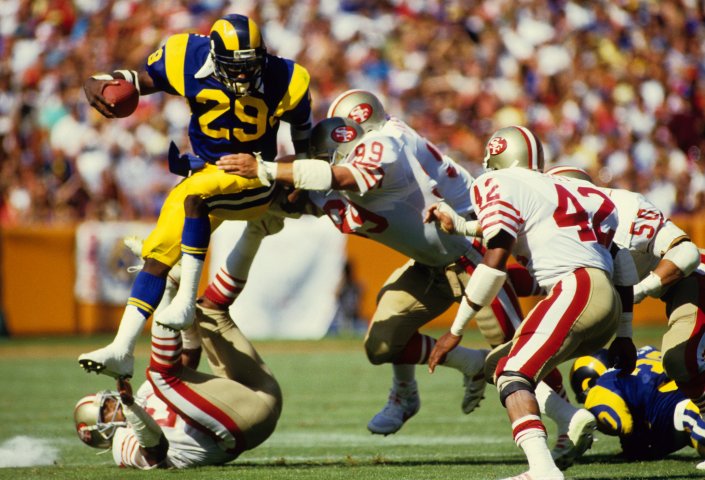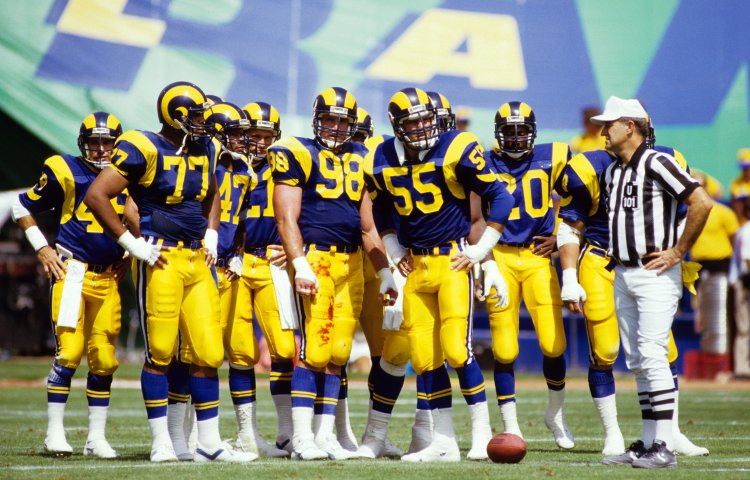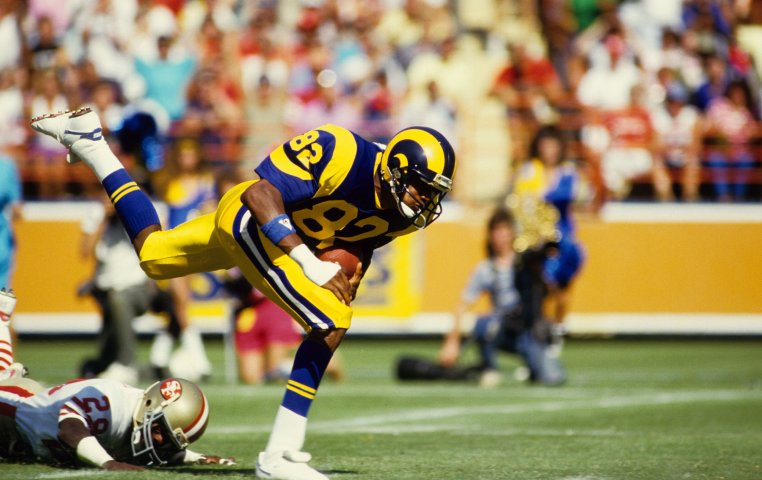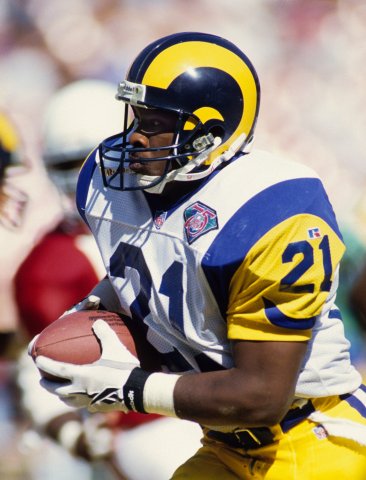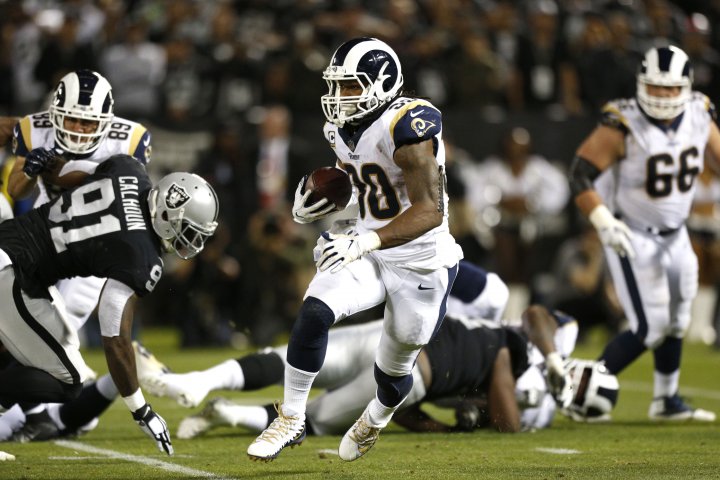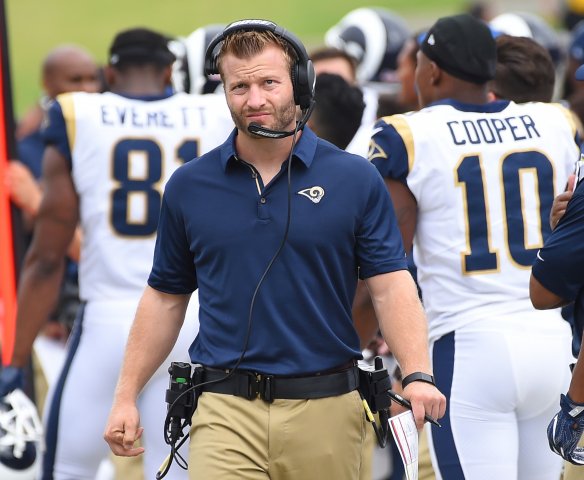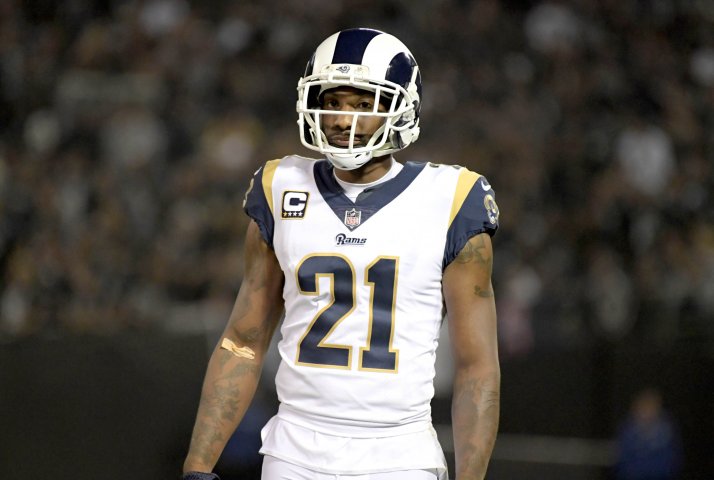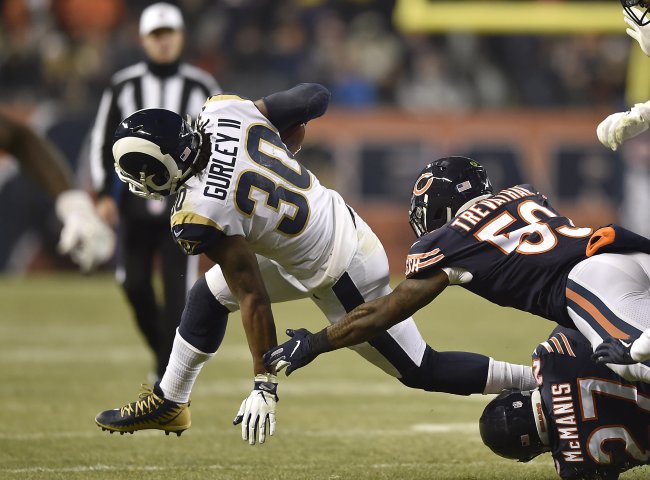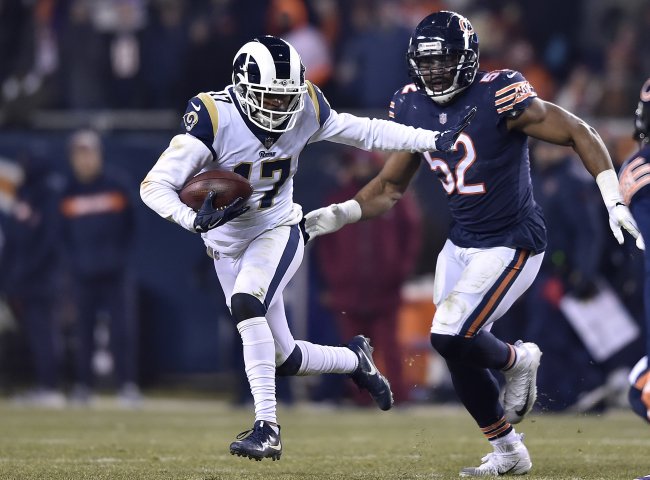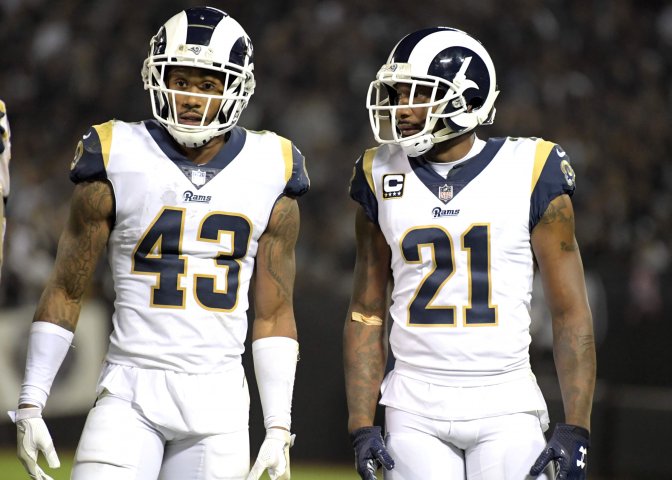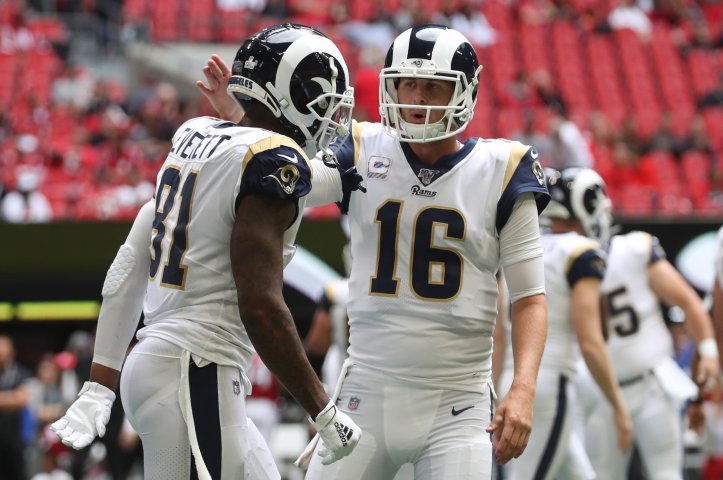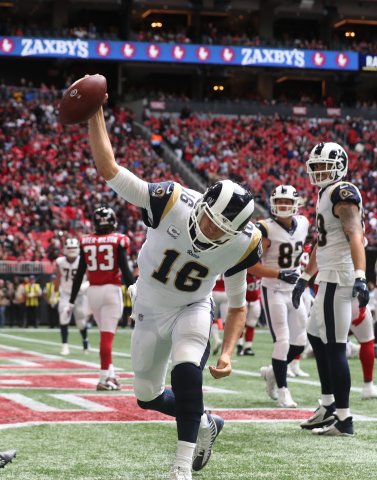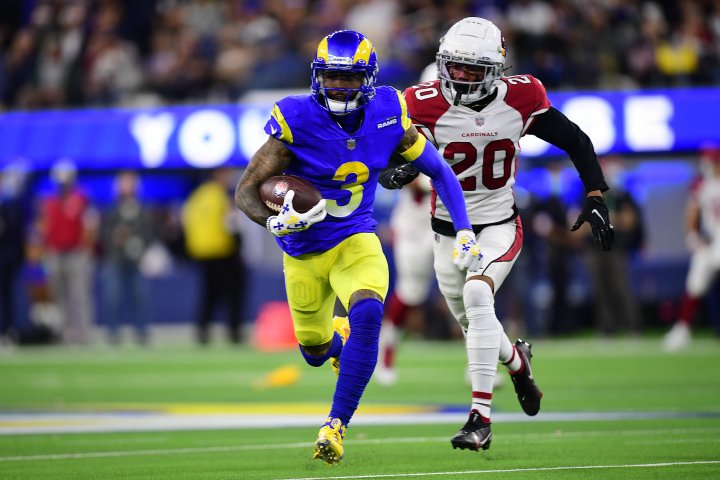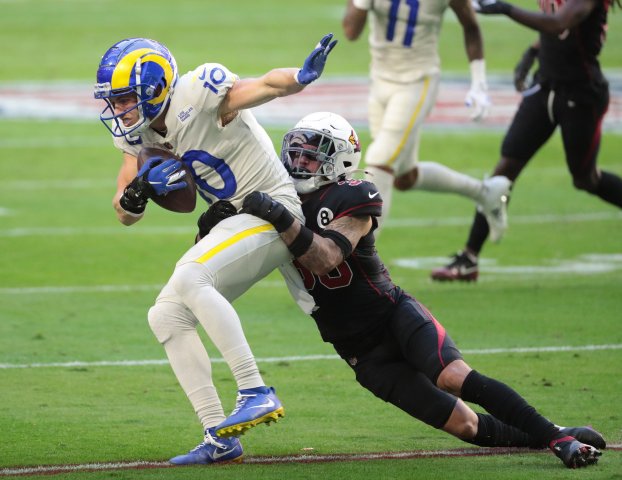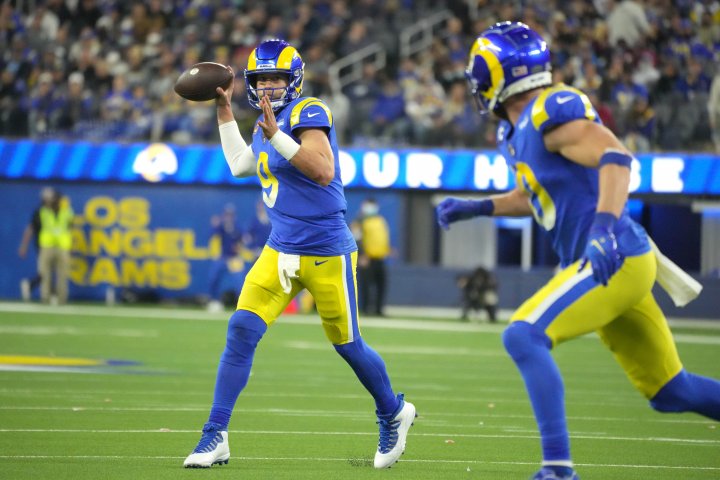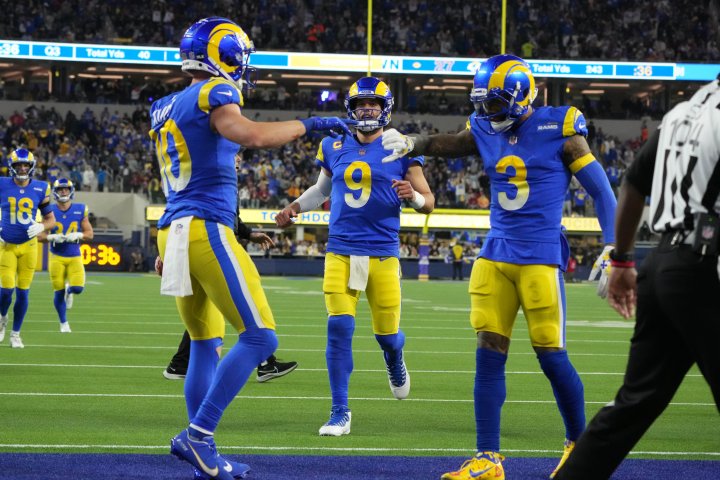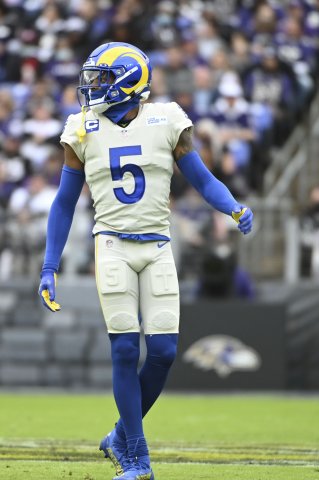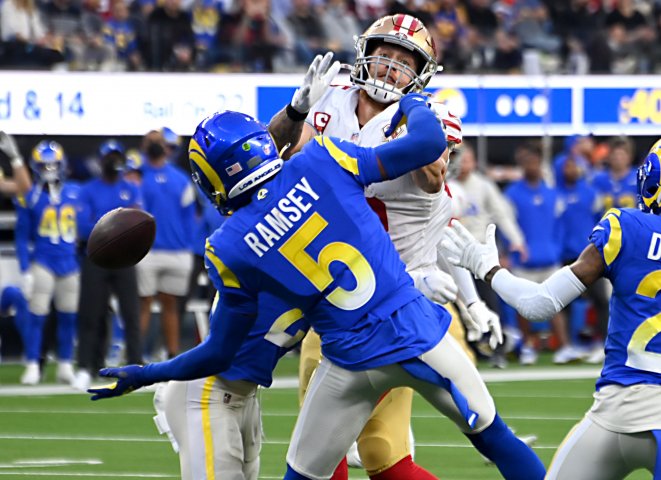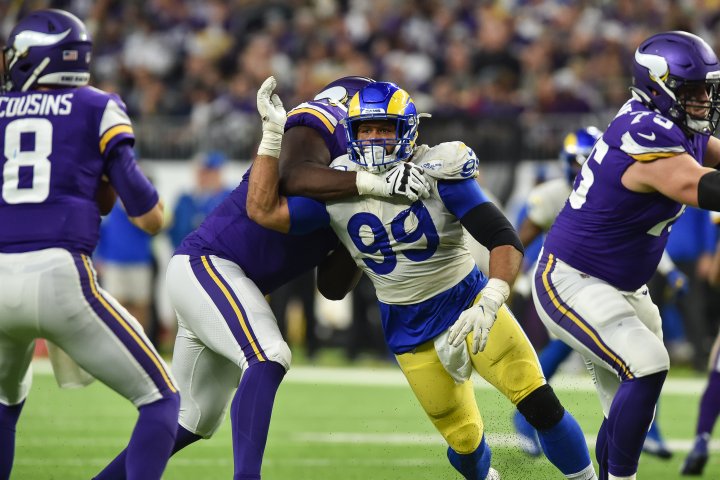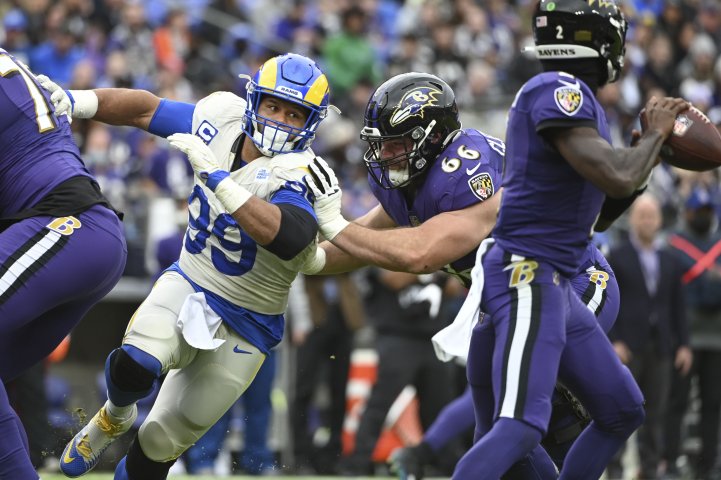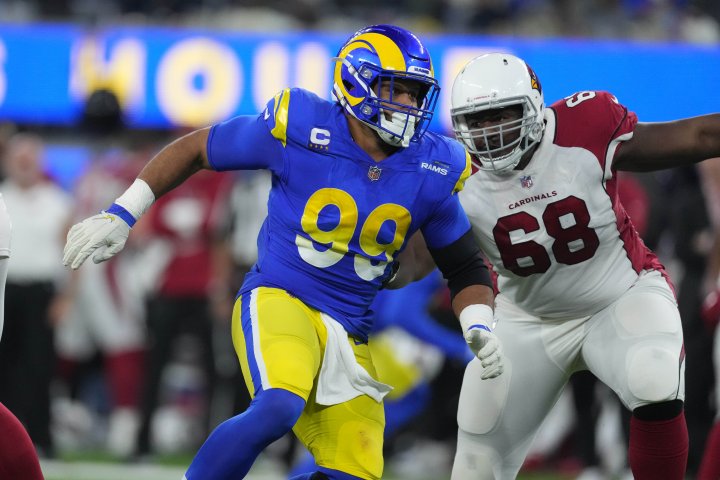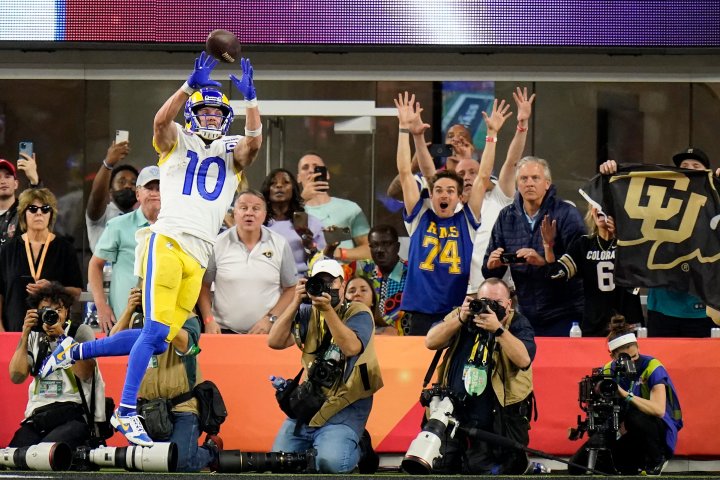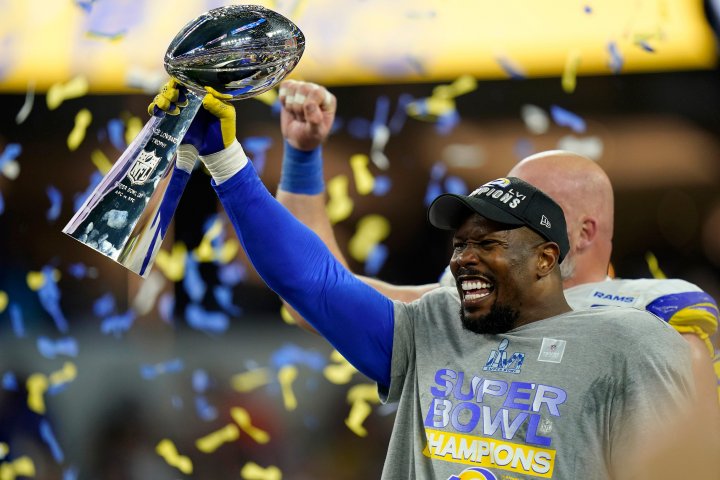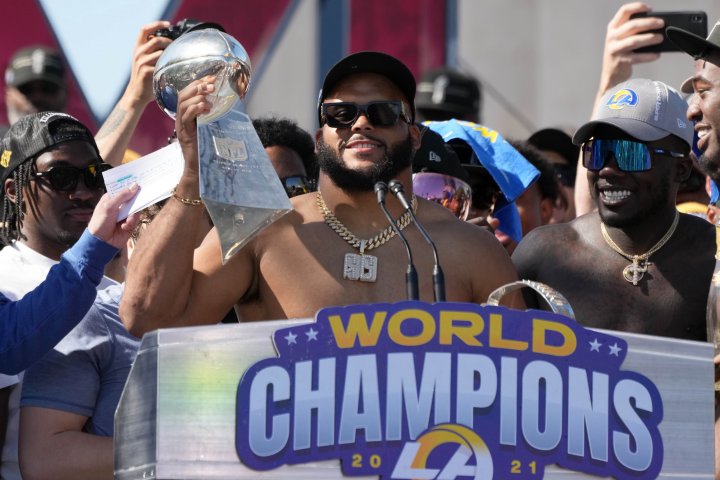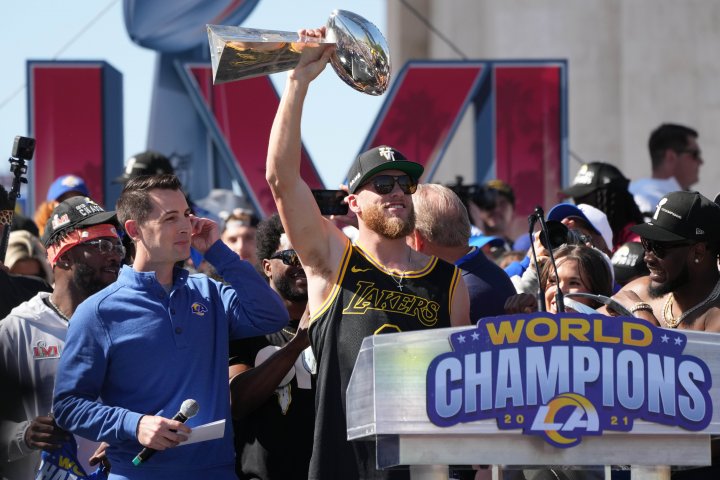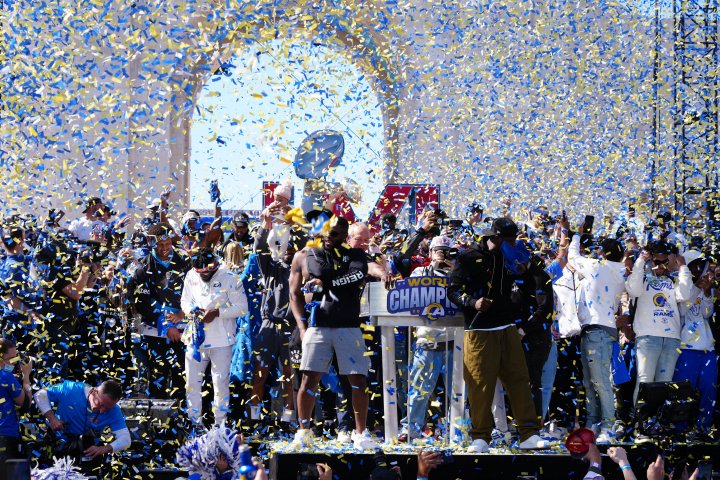TEAM HISTORY
One of the National Football League's oldest franchises, the Rams began their football life in Cleveland in 1937. The Cleveland Rams were founded by attorney Homer Marshman in 1936. Their name, the Rams, comes from the nickname of Fordham University. “Rams” was selected to honor the hard work of the football players that came out of that university. They were part of the newly formed American Football League and finished the 1936 regular season in second place with a 5–2–2 record, trailing only the 8–3 record of league champion Boston Shamrocks. On January 12, 1946, Reeves obtained the consent of the NFL to allow his team to relocate to Los Angeles and the Los Angeles Memorial Coliseum, which had a seating capacity at the time of 105,000 far greater than their Cleveland venue. This placed the Rams more than 2,000 miles (3,200 km) away from the nearest NFL team, at the time (in Chicago). In 1980 they moved to Anaheim Stadium. In 1994 they were relocated to St. Louis. In 2019 they moved back to Los Angeles.
They did no better than a .500 mark once during their first six seasons. They then disbanded for a year in 1943 because of the manpower shortages of the World War II era. When they finally did record a winning season, they hit the jackpot with a 15-14 victory over the Washington Redskins in the NFL championship game. A sensational rookie quarterback from UCLA, Bob Waterfield, was the league's Player of the Year.
That championship game proved to be the last the Rams would ever play in Cleveland. Dan Reeves, a shrewd businessman and a master innovator who had bought the team in 1941, decided to move the Rams to Los Angeles for the 1946 season. He then signed Kenny Washington and Woody Strode to make them the first two African-American athletes with an NFL contract since 1932. Reeves also instituted the famed "Free Football for Kids" program, providing the groundwork for today's successful TV policies, and became the first to employ a full-time scouting staff.
In their first four seasons on the West Coast, the Rams had to wage a costly head-to-head battle with the intra-city Dons of the All-America Football Conference. Reeves and the Rams suffered mammoth financial losses. But the AAFC folded after the 1949 season just as the Rams were embarking on a string of outstanding seasons on the field. They won four NFL Western division championships in seven years and captured their second NFL title in 1951. With Waterfield and Norm Van Brocklin connecting regularly on long bombs to Elroy "Crazylegs" Hirsch and Tom Fears, the Rams played an exciting, glamorous brand of football.
The effect at the gate was outstanding. Topped by a crowd of 102,368 for a San Francisco 49ers game in 1957, turnouts in the Coliseum topped 80,000 on 22 occasions during the Rams' first 20 years in Los Angeles.
The heady successes of the early 1950s produced one final divisional championship under a rookie coach, Sid Gillman, in 1955. Then the Rams slipped into the second division, not to return to championship contention again until 1967.
By that time, George Allen had taken over the coaching reins. Allen fashioned the highly-publicized "Fearsome Foursome" line that included future Hall of Famers Merlin Olsen and Deacon Jones. Allen's five-year record was 49-19-4, best ever for a Rams coach. The Rams continued their winning ways through the 1970s. They won five straight NFC Western division championships from 1973 to 1977 with Chuck Knox at the helm and then two more divisional titles after Ray Malavasi replaced Knox in 1978. The 1979 Rams won the NFC championship before losing to Pittsburgh 31-19 in Super Bowl XIV.
In 1972, the Baltimore Colts' Carroll Rosenbloom traded franchises with Bob Irsay and took control of the Rams. Rosenbloom died in 1979 and his widow Georgia replaced him as owner/president. In 1995, the Rams moved to St. Louis where they played in the Edward Jones Dome. In 1997, the Rams hired former Philadelphia Eagles coach Dick Vermeil.
Two years later, in 1999, the Rams were transformed into Super Bowl champions. Guided by quarterback Kurt Warner and running back Marshall Faulk, the team beat Tennessee 23-16 in a thrilling Super Bowl XXXIV. Following the victory, Vermeil retired and was replaced by Mike Martz, the team's offensive coordinator. In 2011, the Rams named Jeff Fisher as their head coach. In 2016, the Rams moved to Los Angeles where they play in the Los Angeles Coliseum.
On January 12, 2017, Washington Redskins offensive coordinator Sean McVay became the new head coach at the age of 30, which made him the youngest in modern NFL history, surpassing Lane Kiffin who was 31 when hired by the Oakland Raiders in 2007.
The Rams began the year 3–2, much like their previous season in Los Angeles. However, the Rams became a quick surprise in the NFL when they won their next four games in a row, including blowouts of the Arizona Cardinals and New York Giants. The games were highlighted by the resurgences of Jared Goff and Todd Gurley, who had mediocre performances in 2016. New acquisitions Sammy Watkins, Robert Woods and draft selection Cooper Kupp at wide receiver made such big impacts that analysts were comparing the 2017 Rams to the "Greatest Show on Turf" Rams of the late 1990s and early 2000s. After scoring a league-worst 224 points in 2016, the Rams led the league in points scored with 478, the fourth-most in team history.
On November 26, 2017, the Rams defeated the Rival New Orleans Saints 26–20. The win was their eighth of the season, which secured the franchise's first non-losing year since 2006, as well as their first in Los Angeles since 1989. A week later, the Rams defeated the Cardinals 32–16 to secure a winning season for the first time since the 2003 season. On December 24, 2017, the Rams defeated the Tennessee Titans 27–23 to clinch their first NFC West title since 2003, and their first in Los Angeles since 1985; they finished the regular season with an 11–5 record. However, the team met an early exit in the first round of the playoffs at the hands of the defending conference champion Atlanta Falcons 26–13.
The Rams opened their 2018 season on September 10 by defeating the Oakland Raiders 33–13 on Monday Night Football, scoring 23 unanswered second-half points in a game during which head coach McVay took on his former mentor, Jon Gruden, who was making his return to coaching. It was the first of two Monday Night Football appearances for the Rams in the season. The Rams continued their strong start with three straight wins at the Los Angeles Memorial Coliseum, shutting out the Arizona Cardinals 34–0 in their home opener in Week 2, defeating the Los Angeles Chargers 35–23 in Week 3 and beating the Minnesota Vikings 38–31 on Thursday Night Football. Los Angeles then went three-for-three on the road with wins at Seattle (33–31), Denver (23–20), and San Francisco (39–10). Returning home in Week 8, Los Angeles rallied to defeat the Green Bay Packers 29–27 to improve to 8–0, their best start since 1969. The Rams were the only remaining undefeated team in the NFL in 2018 until losing on the road to the New Orleans Saints in Week 9 at the Mercedes-Benz Superdome. The Rams bounced back with three straight wins, defeating the Seattle Seahawks 36–31, and then winning a wild 54–51 shootout against the Kansas City Chiefs on Monday Night Football. Following a bye week, the Rams beat the host Detroit Lions 30–16 in Week 13 to clinch both a playoff berth and their second straight NFC West title. Los Angeles stumbled with back-to-back losses to the Chicago Bears and Philadelphia Eagles, and in the latter of those two games, franchise running back Todd Gurley suffered a leg injury that later led to inflammation, forcing him to miss the Rams' final two regular-season games, but the team finished strong with victories over the Arizona Cardinals and San Francisco 49ers to clinch a first-round bye. The Rams' 13–3 record tied for the second-most wins in a single season in franchise history and were the most ever for any NFL team in Los Angeles.
The Rams began their playoff run by defeating the Dallas Cowboys 30–22 in the divisional round to head to the NFC Championship Game for the first time since January 2002. The following week, the Rams beat the Saints on the road 26–23 to advance to the Super Bowl for the first time since Super Bowl XXXVI in January 2002, and since Super Bowl XIV in January 1980 as a Los Angeles team. The game featured a controversial ending: on a third-down play inside the final two minutes with the score tied at 20, Rams cornerback Nickell Robey-Coleman made contact with Saints receiver Tommylee Lewis well before a pass from Saints quarterback Drew Brees had arrived. Additionally, Robey-Coleman delivered a helmet-to-helmet hit; however, no flag was thrown for pass interference or the illegal hit, leading to outrage from Saints players and fans as this denied New Orleans a first down, which would have likely put the game out of reach. After the game, there was speculation but no clear video evidence that the pass was tipped.
The Rams lost in Super Bowl LIII held at the Mercedes-Benz Stadium in Atlanta, Georgia to the New England Patriots by a score of 13–3 in the lowest-scoring Super Bowl in history. It was the first time in 35 years that a Los Angeles team was featured in a Super Bowl.
Before Super Bowl LV had even been played, the Rams agreed to a blockbuster trade, as they dealt an inconsistently performing Jared Goff to the Detroit Lions in exchange for Detroit's own quarterback, Matthew Stafford. Acquiring Stafford came at a steep price, as Los Angeles gave up a 2021 third-round pick and two first-round picks in 2022 and 2023. The offseason saw more losses, as defensive coordinator Brandon Staley left to become the head coach of the crosstown rival Chargers, while the team also traded Michael Brockers to the Lions, and chose not to retain impending free agents John Johnson, Gerald Everett and Josh Reynolds. The Rams added more depth at wide receiver, signing free agent DeSean Jackson and drafting Tutu Atwell. Another addition came when the team suffered the loss of Cam Akers for the season due to an Achilles injury, and veteran Sony Michel was tapped as the replacement.
Prior to the start of the season, SoFi Stadium was given the clearance to allow fans to attend Rams games for the first time during the pandemic. The Rams opened their 2021 season on Sunday Night Football against the Chicago Bears. In front of a full capacity crowd, Matthew Stafford exploded in his Los Angeles debut, throwing for three touchdowns and 321 yards as the Rams defeated the Bears 34-14. The Rams followed it up with a close 27-24 win over the Indianapolis Colts before a strong victory against the defending Super Bowl champion Tampa Bay Buccaneers, 34-24. The Rams were handed their first loss of the season against the division rival Arizona Cardinals, ending their perfect record against the Cardinals under Sean McVay, though the team was able to bounce back in a wild 26-17 win over another division opponent, the Seattle Seahawks, before a blowout win over the New York Giants 38-11. The Rams then squared off with Stafford's former team, the Lions, while also facing their former quarterback Jared Goff, a back-and-forth matchup that resulted in the Rams prevailing 28-19.
A day after defeating the Lions, the team traded linebacker Kenny Young to the Denver Broncos, and later confirmed that DeSean Jackson would be permitted to seek a trade. Jackson would later be released into free agency after the team was unable to find a trade partner. On Halloween, the Rams offense exploded for a 38-22 win over the Houston Texans. A day after the victory, the Rams made a blockbuster move, acquiring Pro Bowl linebacker Von Miller from the Broncos in exchange for two draft picks. However, Miller was unable to make his debut the week he was traded, as he was still dealing with an ankle injury. On November 11, Los Angeles would then make another blockbuster move, signing former Cleveland Browns wide receiver Odell Beckham Jr. to a one-year deal.
However, the new acquisitions did not result in immediate dividends as the Rams lost three straight games to fall to 8-4. Turnovers plagued Los Angeles in both a 28-16 loss to the Tennessee Titans on Sunday Night Football and a 31-10 rout at the San Francisco 49ers on Monday Night Football, L.A.'s fifth straight loss to their traditional rival. Following a bye week, the Rams fell on the road at Green Bay in 36-28 loss to the Packers that dropped Los Angeles to 8-4. A 37-7 win at home versus the Jacksonville Jaguars ended the Rams' skid, which was then followed by a resounding 30-23 victory on the road against Arizona. Despite missing half a dozen starters due to COVID-19 protocols, the Rams pulled away in the second half as Matthew Stafford threw touchdown passes to Cooper Kupp, Van Jefferson and Odell Beckham Jr. to thrust L.A. back into the NFC West Division race. Though COVID-19 issues caused the Rams' home game against Seattle to be postponed for two days, Los Angeles clamped down on the Seahawks 20-10 for its third straight victory. In that game, Cooper Kupp caught nine passes for 136 yards and two TDs, and his 122 receptions through 14 games surpassed the Rams' single season receptions record held by Hall of Fame wide receiver Isaac Bruce. The Rams clinched their fourth NFC playoff berth in five seasons the following week by holding off the host Minnesota Vikings 30-23. After going winless (0-3) in November, the Rams won four straight in December. This allowed the Rams to finish in 1st place in the NFC West. They defeated the divisional rival Arizona Cardinals, Tampa Bay Buccaneers, and the divisional rival San Francisco 49ers to reach Super Bowl LVI, where they faced the Cincinnati Bengals and took home their second Super Bowl win as well as their first Super Bowl win in Los Angeles.

